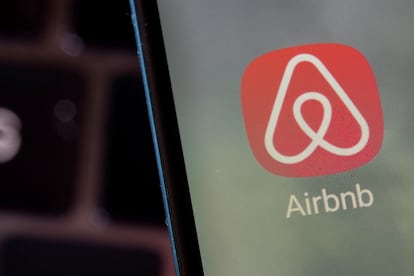Booking vs Airbnb: The battle of the vacation rental giants
The former doubled the latter’s turnover, reaching more than $21 billion. The latter made more money due to reduced marketing and personnel expenses

2023 was the first year in which the tourism sector once again resembled 2019, before the outbreak of the pandemic brought everything to a standstill for two years. Initial estimates by the World Tourism Organization (UNWTO) indicate that last year saw 1.3 billion tourists travel to other countries, representing an 88% increase over pre-crisis levels. In addition, the 1.4 billion mark will be bypassed this year. Only the Middle East exceeded the 2019 figures, while the other regions still have a long way to go.
The return of global tourism and its expected growth has been leveraged by Booking and Airbnb, the two leading U.S. platforms that manage the accommodation for tourists. In the last two weeks, both companies have submitted their 2023 financial results, which reveal an unprecedented soundness, albeit with significant differences between the two firms.
Booking is the online agency with the highest revenue worldwide, with $21.365 billion in 2023, 25% more than in 2022, and more than double that of Airbnb ($9.917 billion). Its catalog comprises more than 28 million listings, of which 6.6 million are holiday homes and apartments. The remaining 21.4 million listings are mainly hotels, followed by flights, car rentals and other travel experiences. Airbnb closed 2023 with 6 million listings of apartments for tourists, bordering on its highest ever figure.
The positions in this ranking are inverted in terms of how much money they are actually making. Airbnb’s net profit peaked in 2023 at $4.792 billion, 2.5 times higher than that of 2022, while Booking’s stood at $4.29 billion, up 40% year-on-year. So how is it that Booking has a turnover of $11.448 billion more than Airbnb, but earns $502 million less? Airbnb sources consulted by EL PAÍS stress that this divergence is the result of lower costs. “We are a company with high margins, since we only have one line of business and we currently do not offer any other services.” In contrast, Booking Holdings, the platform’s parent company, employs close to 22,000 people working on its various brands (Booking.com, Agoda, Priceline, Kayak, Rentalcars.com and OpenTable), compared to Airbnb’s 6,000.
Another of the key factors they point out to account for this difference in profit compared to Booking is the stringent cost control exercised by Dave Stephenson, the executive hired from Amazon in 2018 as CFO. Since December 2023, Stephenson has been the platform’s leading chief business officer since it launched (Stephenson was replaced as CFO by Ellie Mertz, former vice president of Finance). Booking spends practically twice as much as Airbnb. The reason for this difference lies in the heavy spending on marketing, mainly on the positioning of the assets it sells on the leading search engines. In 2023 alone, the cost of this area amounted to $6.8 billion, almost double the sum invested two years previously. In addition to this outlay, there was a substantial increase in the personnel expenses, which grew by nearly $900 million. This was due to two reasons: the significant hiring of staff and the payment of compensation in line with the company’s share price, divided into three different amounts of $530, $404 and $370 per employee.
Changes for 2024
This divergence between Booking’s and Airbnb’s revenues and profits will partially narrow in 2024 as a result of the plans announced by Airbnb to target new businesses. “We believe that now is the time for us to expand beyond our core business and reinvent Airbnb. While this will be a gradual, multi-year journey, we are excited to share more about this later in 2024,″ the company enigmatically noted in its letter to shareholders. “Airbnb is at an inflection point. We spent the last three years perfecting our core service, and now we are ready to embark on our next chapter.”
What will the next chapter be? In order to maintain this growth rate, the company anticipates that it will have to expand, either through new lines of business or by entering new markets. In the first instance, this would entail moving away from the sole focus on tourist apartments, expanding its hotel options (it already has a website offering hotel rooms called HotelTonight, which it acquired in 2019) and expanding additional experiences, car rentals or flights section. This would involve increasing its expenditure, which would lead to a reduction in profits in the short and medium term. Another alternative might be to prioritize the expansion of accommodation in Latin America and Asia, the two regions of the world where the company has a minority presence, which would also diminish profits.
Another factor that should reduce the revenue gap between Booking and Airbnb will be the fine that Spain’s National Markets and Competition Commission (CNMC) slapped Booking with last week. This is a penalty of $530 million, the largest sanction imposed ever for “abuse of a dominant position with regard to the intermediation services offered by the hotels.” The proceedings were opened as a result of two complaints filed with the CNMC by the Spanish Association of Hotel Managers and the Madrid Hotel Business Association.
In its latest results presentation, released in the early hours of Friday morning, Booking Holdings announced that it had posted “a $530 million loss on 2023 results relating to a preliminary ruling by Spain’s competition authority,” as presented to the U.S. supervisor of financial markets, the Securities and Exchange Commission (SEC). The platform was highly critical of the CNMC’s proposed resolution, strongly disagreed with its conclusions and has expressed its intention to appeal it “if it should be final.”
Sign up for our weekly newsletter to get more English-language news coverage from EL PAÍS USA Edition
Tu suscripción se está usando en otro dispositivo
¿Quieres añadir otro usuario a tu suscripción?
Si continúas leyendo en este dispositivo, no se podrá leer en el otro.
FlechaTu suscripción se está usando en otro dispositivo y solo puedes acceder a EL PAÍS desde un dispositivo a la vez.
Si quieres compartir tu cuenta, cambia tu suscripción a la modalidad Premium, así podrás añadir otro usuario. Cada uno accederá con su propia cuenta de email, lo que os permitirá personalizar vuestra experiencia en EL PAÍS.
¿Tienes una suscripción de empresa? Accede aquí para contratar más cuentas.
En el caso de no saber quién está usando tu cuenta, te recomendamos cambiar tu contraseña aquí.
Si decides continuar compartiendo tu cuenta, este mensaje se mostrará en tu dispositivo y en el de la otra persona que está usando tu cuenta de forma indefinida, afectando a tu experiencia de lectura. Puedes consultar aquí los términos y condiciones de la suscripción digital.









































